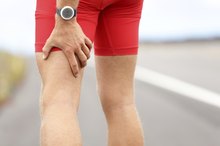Effects of Not Having a Proper Cool Down
Cooling down after exercise might not be as important as people think, Hirofumi Tanaka, a University of Texas exercise physiologist, told the “The New York Times.” Tanaka argues that no science points to the cool-down as being definitively effective. There is also no clear definition of what a cool-down is. Most people agree, however, that walking after a run is a cool-down, for example. Stretching can also be part of a cool-down. What is also unclear is what a proper cool-down is supposed to do. The best advice is to discuss this issue with your doctor. This is especially important if you have heart disease.
Heart Arrhythmias
Sudden stops in exercise are not good for the heart and blood vessels, said Aaron Baggish of Massachusetts General Hospital, in CommonHealth. Baggish is also the cardiologist for the Boston Marathon. After exercise is when heart arrhythmias -- irregular heartbeats -- are more likely to occur. Arrhythmias can be harmless, but they could increase your risk of stroke or heart failure, according to MayoClinic.com. Help prevent an arrhythmia by cooling down. Baggish suggests doing whatever you just did in reverse. If you were running, jog, then walk until your body is rested.
Dizziness
Symptoms of Bone Spur in the Foot
Learn More
Not having a proper cool-down can cause blood pooling, a condition that occurs when you suddenly stop after exercise. During exercise, the blood vessels in your legs and feet expand to allow more blood to flow to those areas. Your heart is also pumping blood faster. A sudden stop causes your heart to slow down, and the blood is pooled in your legs and feet. This can cause dizziness, fainting and narrowing of blood vessels to the heart, a particular concern for people with heart disease. Blood pooling typically occurs in top athletes or in ordinary athletes who work out particularly hard, Paul Thompson, a cardiologist and researcher at Hartford Hospital in Connecticut, told "The New York Times." If you work out hard, it’s a good idea to cool down to prevent dizziness.
Misconceptions
Many people say that a cool-down helps prevent sore or tight muscles. But a South African study reported in “The New York Times” found that a cool-down did nothing to prevent sore muscles. Carl Foster, an exercise physiologist at the University of Wisconsin-La Crosse, called muscle tightness from not cooling down “an old wives’ tale,” because there is no data to suggest this actually occurs.
It Doesn't Hurt
How to Treat Severe Muscle Soreness From Weightlifting
Learn More
According to MayoClinic.com, it is unclear whether cooling down reduces muscle injury, soreness and stiffness. But it does not hurt your body to cool down, and it does help regulate blood flow. So if you have the time, you should cool down after your workout for five or 10 minutes.
Related Articles
References
Writer Bio
Laura Agadoni has been writing professionally since 1983. Her feature stories on area businesses, human interest and health and fitness appear in her local newspaper. She has also written and edited for a grassroots outreach effort and has been published in "Clean Eating" magazine and in "Dimensions" magazine, a CUNA Mutual publication. Agadoni has a Bachelor of Arts in communications from California State University-Fullerton.








